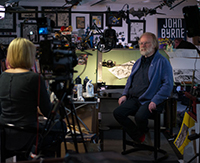Ed Catto and The Charlton Comics Documentary!
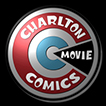
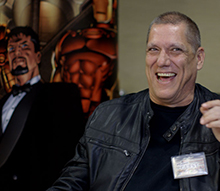 I’ve been writing about several of the impressive Geek Culture entrepreneurs I met at this year’s New York Comic-Con, but the real-life Gotham City certainly doesn’t have a monopoly on these passionate creators who are making it happen.
I’ve been writing about several of the impressive Geek Culture entrepreneurs I met at this year’s New York Comic-Con, but the real-life Gotham City certainly doesn’t have a monopoly on these passionate creators who are making it happen.
The Buffalo Comic-Con is run by Emil Novak and his team. They’re also the folks behind Buffalo’s long-lived comic shop, Queen City Bookstore. It’s a great shop full of treasures, staffed by people who love both comics and customer service.
I was invited to be a panelist at their convention a few weeks back. As we were wrapping up our panel, the next folks were setting up and I realized that was the panel I wanted to see. Keith Larsen and Jackie Zbuska are creative entrepreneurs and they are passionate about their Charlton Comics documentary.
Ed Catto: This project seems like a lot of fun! How’d it all start?
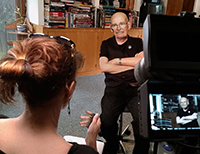 Keith Larsen & Jackie Zbuska: So what’s our origin story? It’s not spectacular, or even exciting. Tired feet and washing dishes. We were at the 2014 ComiCONN in Bridgeport, CT. It was an awesome venue with lots to do, but after a few hours, we really needed a break off. Keith noticed a ticker ribbon message advertising a panel featuring Denny O’Neil, Bob Layton, and Paul Kupperberg. Perfect! Comic book legends and our excuse to sit!
Keith Larsen & Jackie Zbuska: So what’s our origin story? It’s not spectacular, or even exciting. Tired feet and washing dishes. We were at the 2014 ComiCONN in Bridgeport, CT. It was an awesome venue with lots to do, but after a few hours, we really needed a break off. Keith noticed a ticker ribbon message advertising a panel featuring Denny O’Neil, Bob Layton, and Paul Kupperberg. Perfect! Comic book legends and our excuse to sit!
We snuck into the panel room as Paul took the stage and announced the panel topic: Charlton Comics! Huh…what? Charlton? Didn’t they go away like, 30 years ago? “And, what the heck is a Charlton? One of those candies you put in the freezer…?”
What about Batman, Denny? What about Iron Man, Bob? Why did you kill Archie, Paul? Charlton?!?!? But, what the heck, we’re nerds who like comics, and the room is pretty packed, so let’s give it 10 minutes and then get back to walking the floor. The whole panel included Paul Kupperberg, Bob Layton, Denny O’Neil, Jose Luis Garcia-Lopez and Frank McLaughlin. After maybe two minutes, we moved from the back of the room to the second row. By the end of the hour, we were hooked. These guys had some hilarious stories!
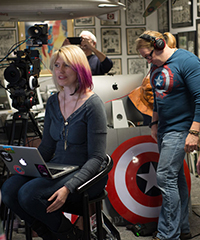 Cut to the next morning: Keith is doing dishes thinking about the Charlton panel… wait a minute!!!! Why not do a documentary about Charlton! Keith called Jackie with the idea. To get things going, Keith would call Mitch Hallock, who produces TerrifiCon. Mitch knew some of the guys from Charlton, so maybe he could help us track them down! Jackie’s response: “Nope, I’ll be there in 20 minutes. We’re driving back down to the con and cold pitching these guys.” The guys obviously said ‘Yes’ to the pitched idea. Since then, we’ve expanded the team, done more interviews, and have been hitting the books to crack the whole saga wide open.
Cut to the next morning: Keith is doing dishes thinking about the Charlton panel… wait a minute!!!! Why not do a documentary about Charlton! Keith called Jackie with the idea. To get things going, Keith would call Mitch Hallock, who produces TerrifiCon. Mitch knew some of the guys from Charlton, so maybe he could help us track them down! Jackie’s response: “Nope, I’ll be there in 20 minutes. We’re driving back down to the con and cold pitching these guys.” The guys obviously said ‘Yes’ to the pitched idea. Since then, we’ve expanded the team, done more interviews, and have been hitting the books to crack the whole saga wide open.
EC: Now, can you remind me how Charlton as a company started?
KL & JZ: The Comics division began only out of the necessity to save money. The Charlton factory was an all-in-one publishing establishment that made their money off Music magazines – like Hit Parader – and crossword puzzle books. They found that it was more cost effective to run the printing presses overnight – and thus Charlton Comics was born!
Oh yeah, and apparently, the idea of Charlton proper was hatched from two guys who met in jail. Weird, right?!?
 EC: Did you have a love of Charlton before undertaking this project?
EC: Did you have a love of Charlton before undertaking this project?
KL & JZ: HAHA. NoooooNoNoNo. As we mentioned above Jackie had never heard of it and Keith has a slight recognition once he saw the bullseye logo, but that’s about as familiar as we got. We take our fair share of social media trolling for it, but as far as we are concerned we see it as a good thing. Approaching the project as filmmakers first and comic book fans second, gives us a fresh and unique perspective on the story. Had we been big Charlton fans, we may have told the tale with a bias or fan perspective. Not knowing anything about it lets us take a clean and honest approach to making the movie.
EC: I’m excited to hear about some of the fans you’ve met along the way. What is the typical Charlton fan like? What are the atypical Charlton fans like?
KL & JZ: Funny enough, the die-hards we encounter are punk rockers from the hey-days of CBGBs. Our one atypical fan is truly unique. He’s a Generation Z 16-year old who’s got a substantial Charlton collection. He’s also a student of the silver age of comics in general. We’d say that his knowledge of the genre rivals that of any adult comic book historian we’ve spoken to. We interviewed him for the movie and we talk to him regularly as he finds Charlton gems at flea markets, tag sales and conventions all over the Northeast.
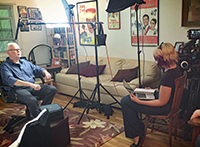

KL & JZ: We’re always surprised to meet new Charlton fans at every one of the stops we make. It’s a unique community of people and happy that our project is exciting to them. It charges us up to know that people are finding out about this movie and supporting us. It’s very flattering that true Charlton fans are trusting us to handle telling this story about something that they cherish so much.
EC: Several Professionals have a spot in their hearts for Charlton. Who carries the torch for Charlton these days?
KL & JZ: Well, a super-fan named Fester Faceplant started a Facebook fan page and set up an online Charlton reading library of digitized Charlton books for fans to read. From there, it ballooned into a full-blown revival in the form of Charlton Neo Media spearheaded by Paul Kupperberg, Mort Todd, Roger McKenzie, Joe Staton and Nick Cuti amongst others. They’re first retail issue of “Charlton Arrow Vol 2” hit stands in October 4th of this year!



KL & JZ: Hmmm, if we tell you, then we’d have to kill you! Hahahaha.
What we can share is that most of the lore of Charlton that exists online is far from the truth. It really lends an extra cutting edge to what our movie will show – the real story behind Charlton Comics – and trust us, life is stranger than fiction.
EC: After all this – What was your favorite Charlton Comic originally and what’s your favorite one now?
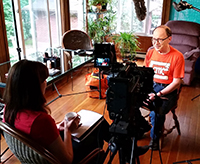

Jackie Zbuska: I instantly gravitated toward their expansive collection of horror titles, which despite the Comics Code, are subversively graphic. I have a soft spot for Gorgo stories, but my true favorite is John Byrne’s Rog-2000. He was in backup stories in some of the E-Man comics.
EC: What’s the timing of the project and how can fans help?
KL & JZ: Honestly, we were hoping for the project to be finished by the end of 2017, but funding dictates how fast we can work. We had financial help via crowd funding, but the money has run out. Unfortunately, with something as unheard of as Charlton Comics with as niche a fan base as it has, it hasn’t allowed us the ability to break into the sphere of pop culture awareness. So, in the case of crowd-funding, our reach has been limited to the marketplace of serious comic book fans or collectors. We’re hoping that our future efforts for raising funds will make strides into appealing to that larger audience potential. Any ideas are welcomed!
You can contribute via our website, www.CharltonMovie.com
EC: Which Charlton comic series is cooler, Judo Master or Gorgo?
Keith Larsen: Judo Master!
Jackie Zbuska: Keith’s wrong, it’s totally Gorgo!
For more information, check out their site at : http://www.charltonmovie.com/ or their panel at the Rhode Island Comic-Con on Friday, November 10, 2017.

